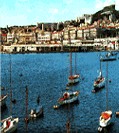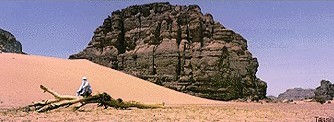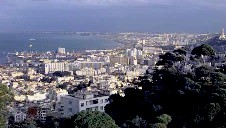|
afrol News, 8 January - Algeria has one of the world's lowest tourism ratios in relation to its great potential. As its Mediterranean Riviera, historical cities and spectacular desert remain abandoned by tourist from nearby Europe, the Algerian parliament adopts new legislation to change this situation. The main problem - political violence - however remains intact. To the west, Algerians jealously are watching Morocco's booming mass tourism resorts at the Atlantic and Mediterranean costs. To the east, Tunisia has established itself as a major all-year destination for European beach-lovers and cultural tourists. 20 hours on ferry northwards, the French Riviera makes one of the world's most famous tourist destinations. Algerian resorts, though, remain empty. The Algerian government is determined to change this unhappy situation. This week, three bills to encourage the development of tourism were passed by the Algiers parliament as tourism emerges the country's new hope for a more prosperous future. The government qualifies the country's tourism resources its "second oil resource," referring to its main export article, petroleum. The new legislation emphasises on the "sustainable development of tourism," meaning that existing tourist resources are to be developed without jeopardising the environment on which they depend. As government plans an expansion of areas and destination for the tourism industry, parliament has demanded a development in line with strict environmental guidelines. The parliamentarians thereupon approved a list of new sites to be developed for tourism. Tourism Minister Lakhdar Dorbani was optimistic after the two bills had been approved, claiming that this would "put an end to the difficulties impeding investments in the tourism sector," and held the new legislation would favour tourist estate. The Ministry was now to set up a national agency for the development of tourism, in charge of the protection of tourism expansion areas, Mr Dorbani said. The third tourism-related bill approved by parliament refers to the use of beaches and the coastline in general. It regulates the exploitation of beaches by commercial interest in the context of the legal principle of free access to the country's coastline for everybody. The law prohibits the commercial use of beaches without having been given a concession.
The new legislation comes in addition to the legal efforts made in the early 1990s to promote tourism. Since 1989, government has liberalised the industry, privatising many of the state-owned and run-down hotels and resorts. Before these reforms, tourism in Algeria was made up of the occasional globetrotter crossing the Sahara. The liberalisation and opening up for foreign investments seemed to point towards a boom, like it had already begun in Morocco and Tunisia. Algeria became famous for its multitude of scenic and cultural destinations. The many Mediterranean resorts - sandy or rocky beaches below the green Atlas Mountain range - offered an aesthetic mixture of colonial French and Arab architecture. The metropolis Algiers additionally attracted visitors to its vibrant showcase Kasbah, built in Ottoman times. The real resource however lay in the unique combination of streamline resorts of the Mediterranean Sea and the other great Sea; the Saharan desert Ocean that connects the country with Black Africa. Adventure tours to the oasis town of Tamanrasset - 2,900 kilometres south of Algiers - or even Sahara-crossings destined for Niger were getting increasingly available for ordinary tourists in the early 1990s. And the jewel of Algeria's Sahara - Djanet and the Tassili, with its famous rock paintings - was just beginning to attract tourist. But than came the civil war. Since 1992, Algeria has been a battleground between Islamic fundamentalists, uncounted militia groups, more or less state-controlled troops and the Berber ethnic minority. Tens of thousands of people have been killed in the most brutal ways and there are continuous attacks on infrastructure - including tourism. Also foreigners have had their throats cut, and in the first years of conflict, they were an outspoken target for the Islamist militias. Since the 1999 elections, the situation is somewhat calmer, but massacres, terrorist attack and political unrest are still reported on a regular basis. Only the southern parts of Algeria have been somewhat spared from the bloody conflict, but the weakened state power has resulted in the flowering of regular banditry, making overland travel in the Algerian Sahara too unsafe for tourists. During the more than ten years of conflict, foreigners have been best advised to avoid Algeria completely. Most embassies left the country 10 years ago, making it even more difficult for tourists to visit the country and to seek assistance if something goes wrong.
Naturally, the country's emerging tourism industry fell apart during the elimination of visiting foreigners. Most of the well-run quality hotels and tourist sites - which were still very few in 1992 - have had to shut down. Now, only a handful "large, internationally-recognized hotels where security is provided" (US State Department) are the only ones recommended by foreign governments and the only one fully operative. According to the Algerian government, the fatal situation is not only due to the years of political violence. According to the state-run news agency APS, there is now a "need to end anarchy and the lack of cohesion experienced by the majority of national tourist structures, by setting up new management modes for these institutions likely to guarantee their survival and valorise the existing natural and cultural wealth." The government seems serious about breathing new life into the shattered tourism industry. Given the existing attractions, the strategy is to encourage private investment, provide high security standards at tourist resorts and go for the modern "ecotourism" concept. As mass tourism seems ruled out, few but wealthy tourists are to be attracted by exclusive resorts. It however remains to be seen whether the new initiative may attract travellers to Algeria while the violence goes on. Foreigners wanting to enjoy Algeria's delights will inevitably think a second time when they read their own government's travel advice. The US government, for example, warns that "unpredictable attacks still occur in rural villages, on roadsides and public transport, and at night." The message is clear: Forget about travelling around, stay in your hotel!
|
front page
| news
| countries
| archive
| currencies
| news alerts login
| about afrol News
| contact
| advertise
| español
©
afrol News.
Reproducing or buying afrol News' articles.
You can contact us at mail@afrol.com



